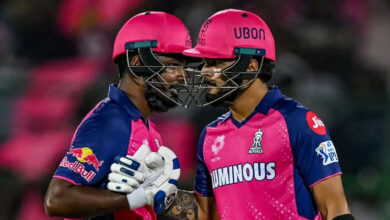Another World Cup miss but for Zimbabwe Cricket, winning may not be the only thing that matters

Some 7,800 miles away from England – where a strong case for winning not being the only thing that matters in sport has been made over the past couple of weeks – in the city of Bulawayo, a defeat doesn’t completely feel like one. Five wins were followed two defeats, and that was that. Zimbabwe will not be playing in the ODI World Cup for a second time in four years. An absence for only a second occasion since they made their tournament debut all the way back in 1983. A defeat to Scotland in the qualifying fixture on Tuesday sealed their fate. Five years back, when the nation hosted the qualifiers for the 2019 World Cup, Godwin Mamhiyo was there to witness another heartbreak, as he was on Tuesday.
“We were there, the whole union, when we lost to the UAE,” he tells The Indian Express, further describing a set of adjectives thoroughly applicable following their most recent outing. “It was shattering, heartbreaking. I’m talking about people who are passionate about this game, people that break down crying when things go wrong. It was a difficult period for Zimbabwe cricket as well as the fans.”
The union he’s talking about is the Zimbabwe Cricket Supporters Union, of which he is the spokesperson. The difficult period he mentions extended over almost three years. An ICC suspension, a T20 World Cup absence and a captain being banning from the world cricket governing body followed. All part of what Mamhiyo – a national franchise cricketer himself – describes as a necessary walk through the fire. “Sometimes in life you have to go through the fire and you come out better on the other side. That’s what had happened with Zimbabwe cricket.” Had. Is it going to happen again? The defeat on Tuesday against Scotland and its consequences are likely to feel as desolate as five years back. For fans such as Mamhiyo, who were pulled to the game watching the likes of Henry Olonga and Andy Flower at the 1999 World Cup followed co-hosting the next edition, a prolonged absence from the competition is bound to hurt. Zimbabwe Cricket however, doesn’t feel like going two paces back – as it did in 2019 – having planted a front foot in the past year. A win against Australia, in Australia, last year, the one against Pakan at the T20 World Cup last year, and another one against the West Indies in the qualifiers this year, provide enough evidence of something special brewing within that dressing room.
Mamhiyo recalls feeling the same last year. “That game just put us over the moon. Even though we had already won a One-Day game against Australia, that Pakan win made us realize this team can go far. They’re quite good. We need to remember, these are the same players that were there three years ago. Something has turned in them.”
But let’s take off our cricket glasses for a wider view. In the backdrop of the Harare Sports Club, and a four minutes walk away, is the State House. Perhaps, the perfect setting for a bigger picture in a nation facing inflation rates going through the roof and a crucial election in a month’s time. There were riots in the capital ahead of the World Cup qualifiers. It is during this time — for the past couple of weeks — that cricket has been a relaxing outlet for the locals.
“It’s been a place where you can go and get a chance to forget any other problem. Not just inflation. Just life problems in general. 100 overs of good cricket, and you can just relax before you go back the next day and start all over again.” It’s not always been the case though. Much like the rest of the continent, football has traditionally been the most followed sport in Zimbabwe. However, the revival of the men’s national cricket team compounded with a FIFA suspension has meant cricket “becoming the number one national sport,” says Mamhiyo. “When you look at the national teams, it’s the one sport that’s filling up the stadiums. People are excited about what the team is doing.”
A plus has been the reshaping of the sport’s image. “In the past, cricket has been marginalised as a sport for the rich.” The most expensive tickets for the ongoing qualifiers — in Grand Stand — haven’t been more than 10 dollars whereas seats across the rest of the ground have ranged around two dollars.
“People can afford it. And it’s good because we’re still trying to grow the game. The more people come out and watch the game, the more they can think, ‘Oh, my child can come and play that game’,” the ZCSU spokesperson says.
Diverse community reach is a must in Zimbabwe, both in terms of those who play and those who consume the sport. “When you are out there supporting, and one of the players is someone who grew up with the next person or in the same neighbourhood, it gets people invested in the sport. You can relate to it. It’s not just a case of you supporting any random person.” For instance the likes of Blessing Muzarabani, Richard Ngarava, and Wellington Pedzisai Masakadza, who come from Highfield – one of the biggest suburbs in Harare – which was established for black settlement during the colonial Rhodesia era.
“Kudos to the Zimbabwe CA for that. They’ve gone 20 years of investing in areas that were not really involved in cricket, setting up a lot of programmes in the rural areas. They’ve put up concrete pitches to try and get the game to people in remote areas,” Mamhiyo tells.
Reciprocal to diversity in the national team has been the same in terms of those who support them. 10 years since its formation, a total of 200 have joined the supporter’s union and pay for a monthly subscription that pays for their game travel — like the 90 who traveled from different parts of the country to Bulawayo for the Sri Lanka game last Sunday. “Some come from the best schools in Zimbabwe, some who play the sport, some who have never, and some that are still learning it.”
It’s been a lively couple of weeks for sure in the Southern African nation. Packed venues with fans from all walks of life, singing in the local tongues of Shona and Ndebele. One chant sticks out. Zimbabwe iTeam yedu. Zora butter unyemwerere. Kanandafa ndoenda ndega, pahukama. Mamhiyo translates it to The Indian Express: “Zimbabwe is our team. Spread your smile. If I die supporting, don’t stress about me.” It was the song of choice in Zimbabwe’s previous outing as well, despite Sri Lanka regering a comprehensive win. “No one needs to tell the next person (in the stands) that we need to keep doing that,” Mamhiyo adds. “If you watch back that game against Sri Lanka after the team lost, they did a lap of honor. They got claps from all around the ground.”
The first half of another relatively short chant that reverberated around Queens Sports Club on Tuesday, is the one to take note of. Hatirohwe: “We don’t lose.” For Zimbabwe Cricket and its custodians perhaps, winning may not be the only thing that matters.







